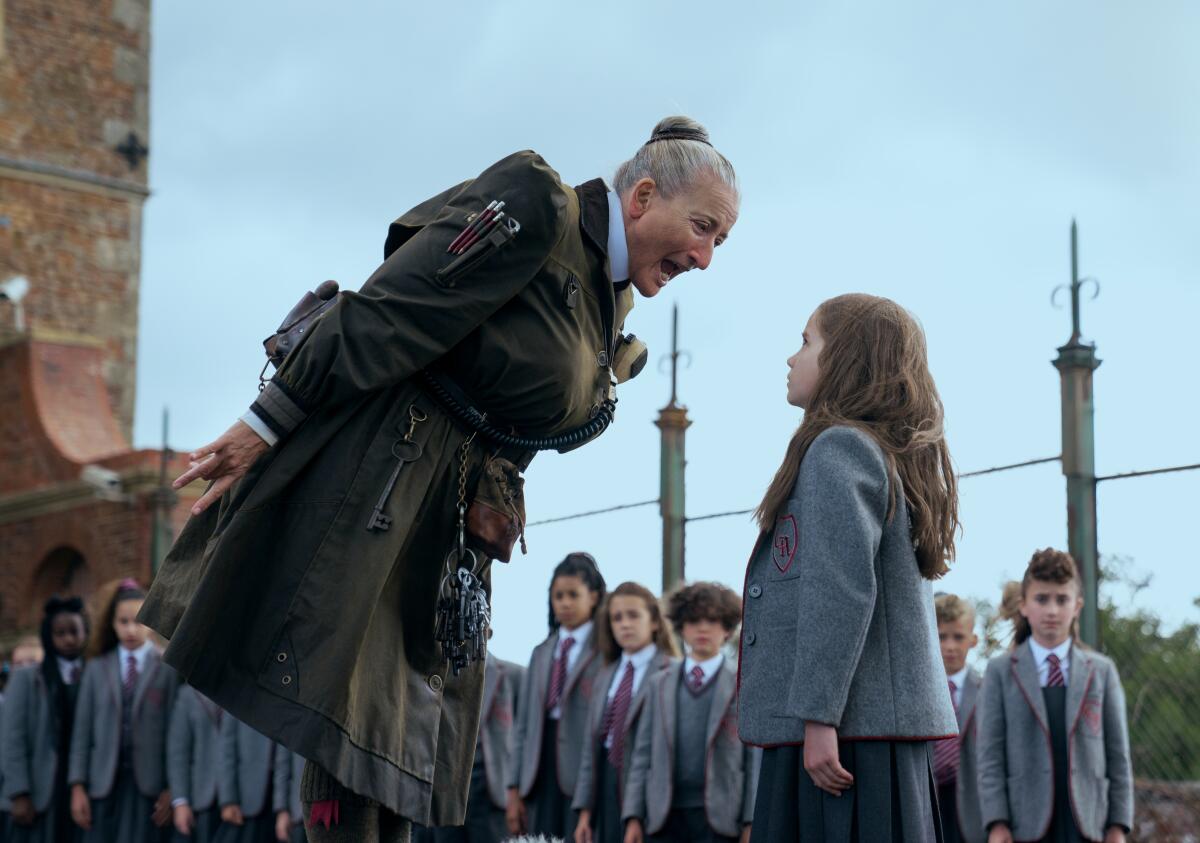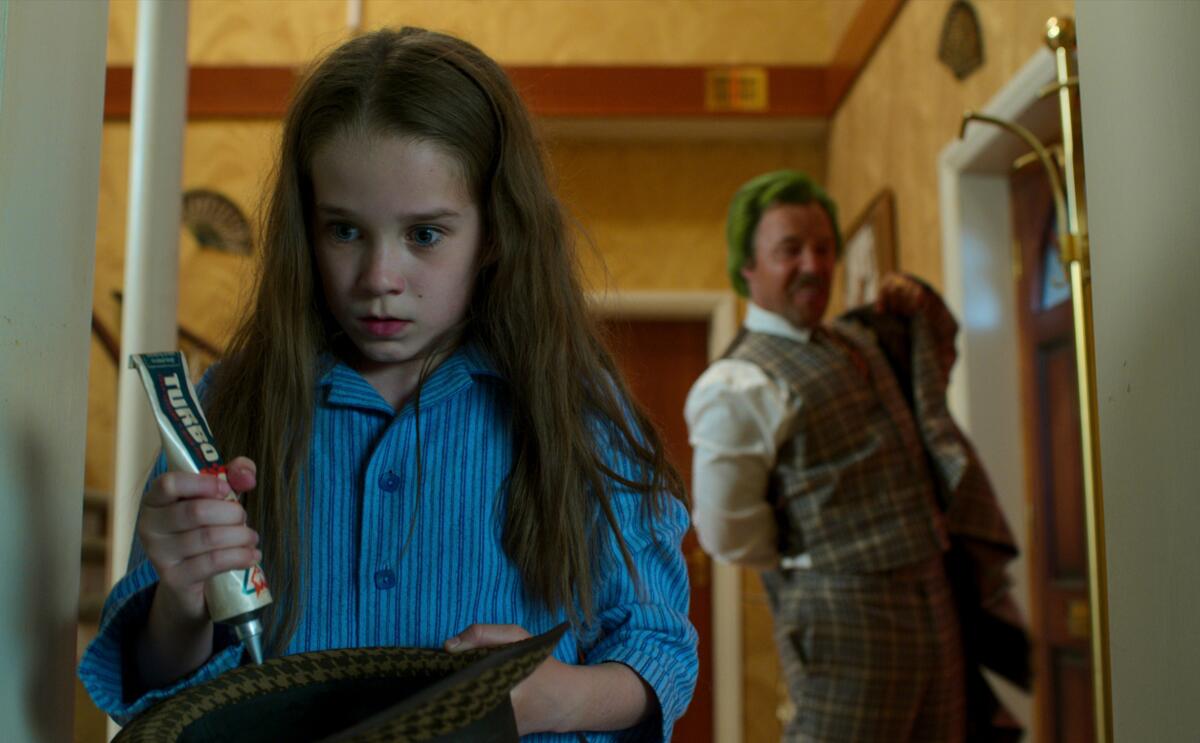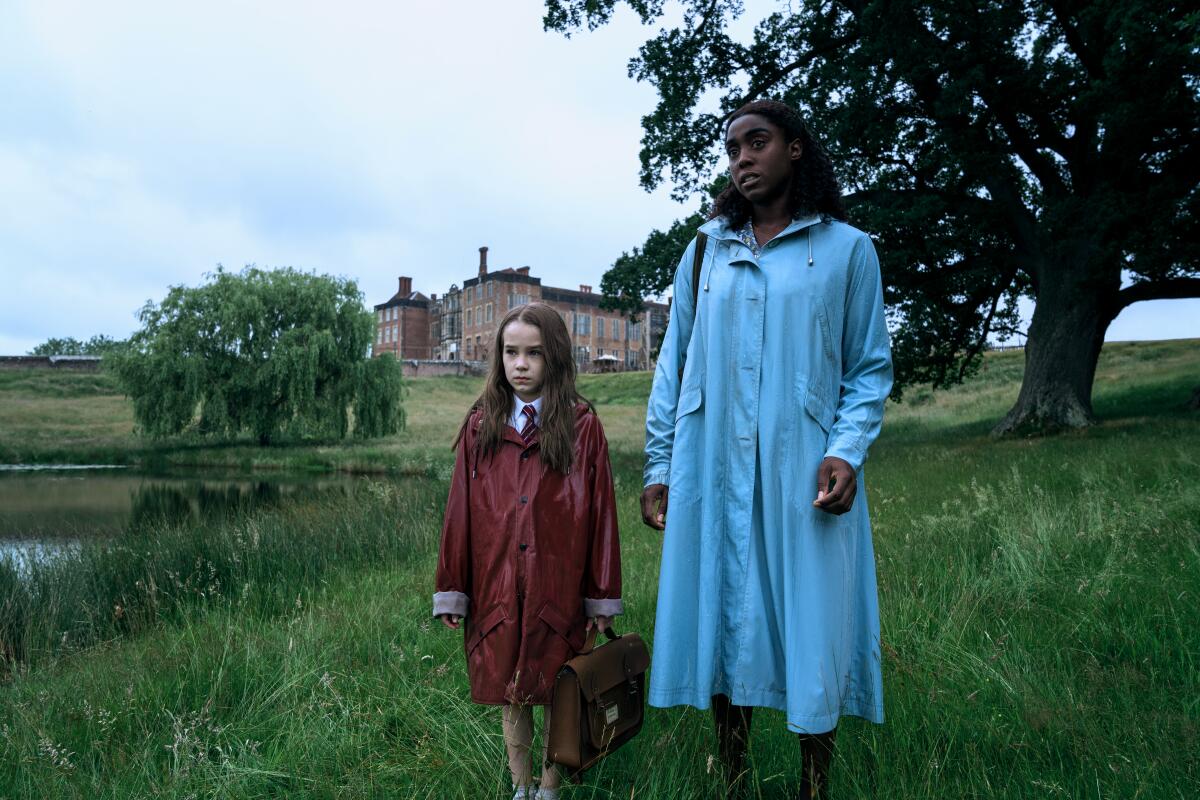Never a dull moment (but many Dahl moments) in the charming ‘Matilda the Musical’

- Share via
“Roald Dahl’s Matilda the Musical” — an unwieldy title but a better one, surely, than “Roald Dahl’s Matilda the Musical: The Movie” — is an enjoyably bright and chipper adaptation of a moving, melancholy story I’ve loved since childhood. I wasn’t alone; I imagine “Matilda” was catnip for a lot of bookish kids with latent Anglophile tendencies and dreams of overthrowing their bullies and escaping humdrum reality.
More grounded and less outlandish than some of the author’s other juvenile fiction, Dahl’s 1988 novel tells of a child genius in a small English village who’s blessed with the kind of extraordinary brainpower that can change the world. It’s spawned a few adaptations already, including an entertaining if bluntly Americanized 1996 film and a justly popular Olivier- and Tony-winning musical that has now directly inspired this new movie.
All that aside, there may be something inherently contradictory about any filmed version of “Matilda,” since the novel itself is something of a children’s cautionary tale about the perils of too much TV watching. (The same logic surely applies to too much Netflix, where this bouncy, bright-colored adaptation will begin streaming Dec. 25, after a brief theatrical run.)
Sit around watching the idiot box night after night and you might become as crooked, ignorant and unrepentantly vulgar as Mr. and Mrs. Wormwood (Stephen Graham and Andrea Riseborough, both garishly amusing), the most unworthy parents of a young girl of astounding intelligence and imagination named Matilda (the winning Alisha Weir).
For your safety
The Times is committed to reviewing theatrical film releases during the COVID-19 pandemic. Because moviegoing carries risks during this time, we remind readers to follow health and safety guidelines as outlined by the CDC and local health officials.
Given the fairy-tale extremes and cruel ironies that tend to govern Dahl’s storybook universe, the Wormwoods’ exceptional stupidity may be precisely what gave Matilda her prodigiously gifted mind.
And for a young reader, her gifts inspire pride, protectiveness and no small amount of wistful envy. To read “Matilda” is to wish your brain could multiply triple-digit numbers as swiftly as any calculator and to feel freshly inspired to plunge headlong into “Nicholas Nickleby,” “Crime and Punishment” and the many other classics that Matilda has managed to plow through by age 6.

The new movie, for all its charms, doesn’t achieve or encourage anywhere near the same buzzing pro-literacy excitement. Neither, to be sure, did the stage show, but it was also sufficiently fresh and transporting that it scarcely mattered. A lot of its pleasures have happily made it to the screen intact, doubtless because its central creative trio — director Matthew Warchus, book writer Dennis Kelly and composer-lyricist Tim Minchin — have retained their equivalent roles behind the camera.
And beneath those pleasures is a potent underlay of feeling: As pastel hues fill the screen and perky melodies and wicked-smart lyrics flood the soundtrack, a tale of a child’s tragic neglect and deep longing comes into focus. At the same time, one of Matilda’s most appealing qualities is her allergy to self-pity, her calm insistence that every kid deserves, and can exact, a measure of justice.
“Just because you find that life’s not fair, it / doesn’t mean that you just have to grin and bear it,” Matilda sings in “Naughty,” brilliantly advancing an airtight case for a child’s revenge. But her parents, however in need of discipline, are too-easy targets.
Once she starts attending school, Matilda has a much bigger fish to fry in the form of Miss Trunchbull, the towering, terrifying headmistress who rules with an iron fist and the credo “Bambinatum est maggitum” (Children are maggots). Played by a sneering, barking Emma Thompson, who donned a fat suit and fascist military garb for the role, the Trunchbull is a memorably exaggerated monster. She’s also prone to extreme acts of child abuse — solitary confinement, pigtail assault — that seem even more outlandish, for better or worse, in this movie’s cheery, effervescent presentation.
Fortunately, even before the story’s clever swerve into Stephen King territory, Matilda has two benevolent adult counterweights to the meanness and indifference that her parents and the Trunchbull represent. One is Matilda’s kind-hearted teacher, the aptly named Miss Honey (a moving Lashana Lynch), who does her best to protect her students from the headmistress’ psychotic wrath. The other is Mrs. Phelps (Sindhu Vee), the traveling bookshop proprietor who enables Matilda’s passion for literature, even as she encourages the child to concoct madly inventive stories of her own.

That leads to one of the movie’s more strained conceits, borrowed but not improved from the stage show, in which Matilda cooks up a romantic tall tale — a circus-set love story — that holds up a fictional mirror to the main action. Onstage, the device had a deft, gossamer-light magic; onscreen, it’s leaden and obvious, one of those strange cases where seeing isn’t quite believing.
And it’s not the only instance in which this “Matilda the Musical” loses something in the transition from magically inspired stagecraft to solid, proficient screen craft. Even some of the more riotous song-and-dance numbers feel more mechanical here, more artificially polished and hemmed in, especially when Matilda and her classmates seize the day with a joyous anthem of liberation called “Revolting Children.”
For a movie that bristles with more revolutionary fervor than Dahl’s quieter, more inward-focused story, “Matilda the Musical” could use a little messier, more rambunctious energy.
The focus and discipline of Warchus’ direction is undeniable, perhaps to a fault: It’s hard not to feel that a 2½-hour show has been whittled down to within an inch of its upbeat, family-friendly life. The surges of emotion are still there, the final comeuppances still rousing, even if the climax itself smothers its most electrifying twist with some predictably ostentatious visual effects. It all can’t help but reinforce Dahl’s point — as well as Matilda’s own steadfast conviction — that the screen really has nothing on the printed word.
‘Roald Dahl’s Matilda the Musical’
Rated: PG, for thematic elements, exaggerated bullying and some language
Running time: 1 hour, 57 minutes
Playing: Starts Dec. 9 at Regal L.A. Live; IPIC Theaters, Los Angeles; available Dec. 25 on Netflix
More to Read
Only good movies
Get the Indie Focus newsletter, Mark Olsen's weekly guide to the world of cinema.
You may occasionally receive promotional content from the Los Angeles Times.











